The Information Technology (Intermediary Guidelines and Digital Media Ethics Code) Rules, 2021 (IT Rules) were notified by the Ministry of Electronics and Information Technology (MeitY) on 25 February 2021. To address the challenges existing in the digital ecosystem, MeitY has proposed amendments to the Information Technology (Intermediary Guidelines and Digital Media Ethics Code) Rules, 2021 (Proposed IT Rules).
The principles on which the proposed amendments have been introduced are as follows:
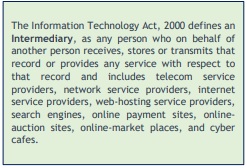
- Internet accessibility: Internet should be open, safe, trusted, and accountable to the users "Digital Nagriks".
- Legal compliance: Intermediaries providing services in India should not contravene the Indian constitution, laws, and rules, and follow them in letter and spirit.
- Quick resolution: Unlawful and harmful information should be quickly removed when reported by users, while also providing a reasonable opportunity to respond in such matters.
- Appellate forum: To address the appeal arising from the impugned orders passed by the Grievance Officer and to protect the rights and interests of the users, appellate forums will be constituted.
Considering the above principles, the MeitY has proposed the below amendments:
1. Obligations on intermediaries
- According to Rule 3(1)(a) and 3(1)(b) of the Proposed IT Rules
all intermediaries are obligated to
ensure:
- compliance by users of their rules, regulations, privacy policy, user agreement, etc. and,
- cause the user to not host, display, publish, upload, transmit, store, update or share information comprised under Rule 3(1)(b).
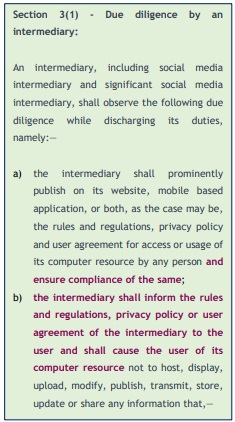 In the purview of
the decision of the Hon'ble Supreme Court in Shreya Singhal v.
Union of India [2015 5 SCC 1], read with Section 79(2)(b) of the
Information Technology Act, 2000 and Rule 3(1)(a) and (b) of the IT
Rules, intermediaries are responsible only to publish their terms
and conditions, privacy policy, user agreement, etc., and inform
their users to not publish, host, upload, transmit, share,
disseminate, or modify any information that falls under Rule
3(1)(b). Further, in Kent RO Systems Ltd. v. Amit Kotak & Ors.
[(2017) 240 DLT 3] the court opined that the legislature has
obliged the intermediaries to only declare to all its users its
policy and advise them not to host any information on the website
of the intermediary which contravenes the applicable laws. Further,
the court also stated that expecting an intermediary to do
screening of the information would be an unreasonable interference
with the rights of the intermediaries to carry on their business
and beyond their scope to ascertain whether the information is
legitimate or not. Thus, the intermediaries cannot be vested with
suo moto powers to screen the information being hosted on their
platform and ensure its compliance with the required law.
In the purview of
the decision of the Hon'ble Supreme Court in Shreya Singhal v.
Union of India [2015 5 SCC 1], read with Section 79(2)(b) of the
Information Technology Act, 2000 and Rule 3(1)(a) and (b) of the IT
Rules, intermediaries are responsible only to publish their terms
and conditions, privacy policy, user agreement, etc., and inform
their users to not publish, host, upload, transmit, share,
disseminate, or modify any information that falls under Rule
3(1)(b). Further, in Kent RO Systems Ltd. v. Amit Kotak & Ors.
[(2017) 240 DLT 3] the court opined that the legislature has
obliged the intermediaries to only declare to all its users its
policy and advise them not to host any information on the website
of the intermediary which contravenes the applicable laws. Further,
the court also stated that expecting an intermediary to do
screening of the information would be an unreasonable interference
with the rights of the intermediaries to carry on their business
and beyond their scope to ascertain whether the information is
legitimate or not. Thus, the intermediaries cannot be vested with
suo moto powers to screen the information being hosted on their
platform and ensure its compliance with the required law.
It is significant to note that as per Section 79(2)(b) of the Information Technology Act, 2000, the intermediary is exempted from the liability arising out of any third-party information, data, or communication link if it is not a) initiating the transmission, b) selecting the receiver of the transmission, c) selecting or modifying the information contained in the transmission. However, Rule 3(1)(a) and (b) of the Proposed IT Rules is contravening Section 79(2) by requiring the intermediary to ensure whether the information uploaded by its users is in compliance with the proposed amendments and adjudicating its legitimacy.
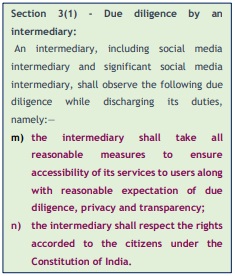 In order to curb
the violation of the constitutional rights of Indian citizens by
intermediaries, Rule 3(1)(m) and (n) have been proposed.
In order to curb
the violation of the constitutional rights of Indian citizens by
intermediaries, Rule 3(1)(m) and (n) have been proposed.
The Proposed IT Rules also put reasonable expectations on intermediaries to conduct due diligence, and maintain privacy, and transparency while ensuring accessibility of their services to all users. It is noteworthy that the term "reasonable expectation" towards due diligence and maintaining privacy and transparency has not been defined under the Proposed IT Rules.
2. Removal of prohibited contents
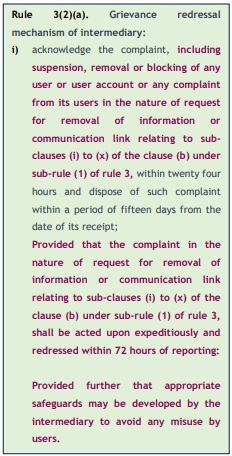
The amendment through the proviso in Rule 3(2) of the Proposed IT Rules proposes expeditious action on any complaint relating to the removal of information or communication link under Rule 3(1)(b) within 72 hours of reporting. The said revision has been introduced to address the challenges with respect to the rapid online dissemination of information to the public. Further, it has been proposed that the intermediary may develop an appropriate safeguard to prevent the misuse of the provision by the users.
A huge information is uploaded on the online portal of an
intermediary. As stated before, to ascertain whether such
information is legitimate and to adjudicate the same is beyond the
ability of the intermediary. Also, the proposed time frame seems to
be insufficient which may result in the removal of information in
haste and passing incorrect decisions. Apropos, neither the
Proposed IT Rules nor the press note released by the MeitY provides
any definition or reasoning with respect to 'appropriate
safeguards' therefore it may place the intermediary in a
disadvantageous situation.
3. Appeal to Grievance Appellate Committees
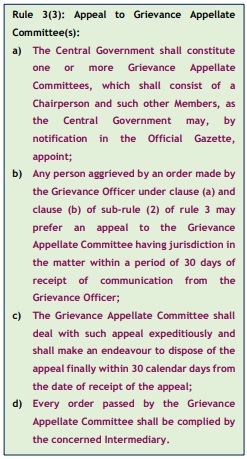
As per the Proposed IT Rules, Rule 3(3)(a to d) a 'Grievance Appellate Committees (Appellate Committee) has to be constituted by the Central Government for redressal of appeal arising out of decisions rendered by the Grievance Officer under Rule 3(2). Any decision passed by the Appellate Committee shall be binding upon the intermediary. The aggrieved person may appeal within 30 days of the decision passed by the Grievance Officer. However, this does not preclude the aggrieved person from availing of an appropriate remedy before the court of law.
It is significant that the amendment only mentions the constitution of the Appellate Committee and has overlooked the grievance redressal mechanism, qualification of members of the Appellate Committee, and its jurisdiction. Further, the amendment has also not dealt with the legal recourse that the intermediary has against the impugned decision passed by the Appellate Committee.
The MeitY has invited comments from the stakeholders on the Proposed IT Rules 2021 on or before 6 July 2022. The MeitY has stated in the press note that the proposed amendments will not impact the start-ups and early-stage Indian companies. It is pivotal that the government should introduce more comprehensive rules to regulate intermediaries and issue the necessary guidelines to address their concerns.
The content of this article is intended to provide a general guide to the subject matter. Specialist advice should be sought about your specific circumstances.


